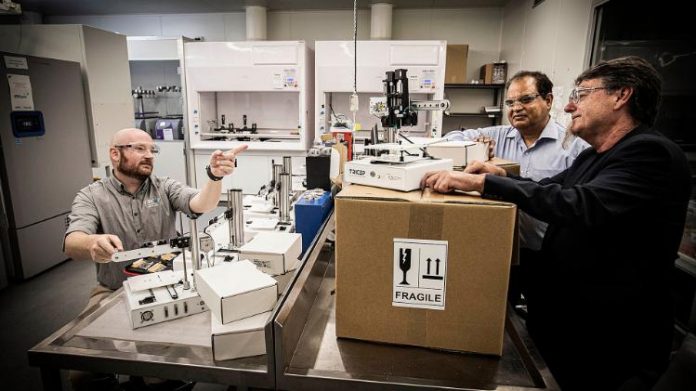
ARC Centre of Excellence for Electromaterials Science (ACES) researchers from the University of Wollongong (UOW) have sent two customised bioprinters designed and manufactured in Wollongong to Indian medical device manufacturers as part of a strategic collaboration between UOW and Andhra Pradesh Medtech Zone (AMTZ) in India.
The printer in question, called 3D Genii, will provide prosthetists in India with access to the latest advances in 3D bioprinting to correct ear deformities, allowing them to print implantable, flexible, customised prosthetic ears that match the anatomy of patients suffering from microtia.
Microtia is a congenital deformity of the ear that has a heightened rate of disease in India compared to Australia.
ACES Director, Distinguished Professor Gordon Wallace AO, said the printer has been built specifically to deliver high precision silicon rubber prints in complex shapes, such as those found in an ear.
“We’ve seen some impressive advances in the partnership between UOW and AMTZ in terms of identifying areas of clinical need, developing the best strategies to meet that need, and bringing together the knowledge and expertise to deliver the most effective solution in the least amount of time,” Professor Wallace continued.
“Both India and Australia have challenges in delivering health innovations to their rural areas. We hope these latest developments will help in reaching out to those patients and healthcare professionals who can work remotely with us to access 3D printing technologies.”
AMTZ will also take receipt of the 3DREDI, a locally designed and manufactured 3D bioprinting research and education system that equips users with the essential hardware and skills to embark on projects in the rapidly emerging bioprinting industry.
The platform has been developed with the input of world-leading clinicians and features an intuitive research bioprinting platform that is capable of creating structures containing living cells. The system comes complete with interactive printing and characterisation tutorials to allow educators and students to familiarise themselves with the capabilities of multi-material bioprinting.
UOW’s Global Brand Ambassador, Adam Gilchrist AM, said the AMTZ team will utilise the 3DREDI system to advance their knowledge in bioprinting while focusing on the use of 3D bioprinted structures for cardiac regeneration.
“UOW already has many strong connections with India, and there’s so much more we could do together,” Mr Gilchrist added.
“It’s exciting to see UOW share its internationally renowned expertise in bioprinting to help India establish a state-of-the-art, affordable and accessible industry that will have a real and significant impact in local communities in both India and Australia.”
















